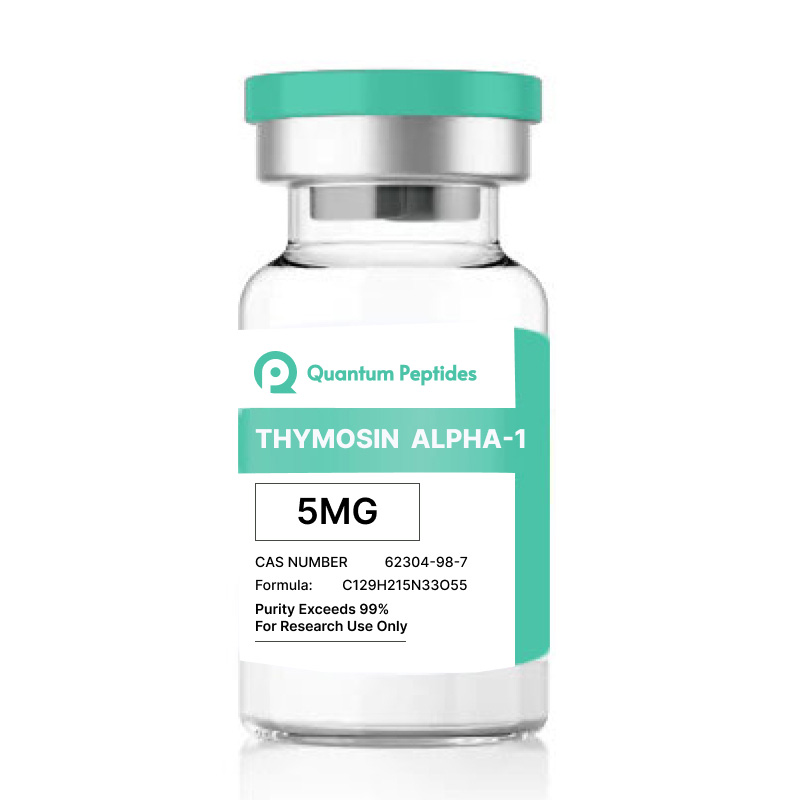Thymosin Alpha-1 (5mg & 10mg)
$76.00 – $140.00Price range: $76.00 through $140.00
Thymosin Alpha-1 serves as an innate modulator of the immune system, extensively investigated for conditions such as respiratory disorders, cystic fibrosis, chronic hepatitis, and cancer. Initially identified in 1972, this peptide was isolated from thymus gland tissue, demonstrating potent regulatory effects on immune function.
Size: 5mg & 10mg
Contents: Thymosin Alpha-1
Form: Lyophilized powder
Purity: >99%
SKU: P-THYMOSA1-5-10
Free Shipping on $200+ orders
Thymosin Alpha-1 Peptide and Immune Modulation
Thymosin Alpha-1, often referred to as TA1 or T α 1, is a peptide fragment extensively investigated for its possible role in immune system modulation. Scientific studies have proposed its involvement in stimulating the production of T-cells, suggesting its potential in managing and alleviating infections as well as limiting bacterial dissemination.
Thymosin Alpha-1 is a naturally derived polypeptide that researchers suggest may have the capacity to rejuvenate and boost immune functions. Acknowledged as one of the polypeptides present in Thymosin Fraction 5, an unrefined extract obtained from the thymus gland, Thymosin Alpha-1 holds potential implications for supporting and enhancing immune responses.
Since its initial identification, scientists have explored a synthetically engineered version of Thymosin Alpha-1, commonly referred to as Thymalfasin. This peptide, Thymalfasin, comprises 28 amino acids, mirroring the natural Thymosin Alpha-1 structure. It is derived from a more extensive polypeptide precursor, Prothymosin Alpha, encompassing 113 amino acids. The investigation into Thymalfasin seeks to understand its potential applications and distinctive characteristics compared to the naturally occurring Thymosin Alpha-1.
Overview
Exploring Thymosin Alpha-1 Immunomodulation: The primary focus of early investigations into Thymosin Alpha-1 aimed to unravel its immunomodulatory capabilities. Research findings propose that this peptide might elevate the levels of the major histocompatibility complex (MHC) class I and stimulate cytokine production, potentially culminating in enhanced immune responses. The scrutiny of Thymosin Alpha-1’s impact on immune system dynamics seeks to uncover novel insights into its mechanisms and potential applications in bolstering immune function.
Thymosin Alpha-1 Potential Mechanisms: Theoretical frameworks propose that the actions of Thymosin Alpha-1 might unfold by selectively influencing T-helper cells and cytotoxic T-cell populations. This peptide is speculated to initiate differentiation in thymocytes (T-cells) and foster terminal differentiation in blood lymphocytes. Researchers explore its potential role in amplifying natural killer cell production and triggering inflammation mediated by cytokines. Moreover, investigations delve into its impact on macrophages, considering its potential to enhance their efficiency, and its modulation of alpha thrombin activity. The intricate exploration of Thymosin Alpha-1’s multifaceted mechanisms contributes to a deeper understanding of its potential immunomodulatory effects.
Scientific Investigations and Clinical Trials
Thymosin Alpha-1 Peptide and Immunodeficiency Evaluation
In this examination of immune system functionality,(6) 11 participants with diverse immunological deficiencies underwent an assessment of their natural killer (NK) and lymphokine-activated killer cells (LAK). The immunocompromised individuals displayed an average LAK-cell activity of around 65% compared to the control group. Introducing Thymosin Alpha-1 to the participants, researchers observed no substantial enhancement in NK or LAK cell levels. Only a subset of 3 participants exhibited a notable improvement in LAK-cell activity, while the impact on others was not statistically significant.
Thymosin Alpha-1 Peptide and Liver Disorders
Clinical investigations were undertaken with individuals experiencing liver ailments, including cases involving Hepatitis B & C. The purpose was to elucidate the potential impact of Thymosin Alpha-1 on these hepatic complications.(3) Among those with Hepatitis B, the research team noted that subjects receiving Thymosin Alpha-1 twice a week demonstrated an augmented virological response rate, showing an increase of 40.6%. In cases of Hepatitis C, subjects reportedly displayed improved outcomes when Thymosin Alpha-1 was administered in conjunction with interferon alpha compounds.
Thymosin Alpha-1 Peptide and Septic Response
In this 2015 meta-analysis,(7) the focus was on comprehensively assessing all relevant clinical trials conducted before 2014 to unravel the potential impact of Thymosin Alpha-1 on septic reactions. A total of 12 controlled trials were scrutinized in this study. The research analysts observed a noteworthy decrease in the reported mortality rate among participants upon the administration of Thymosin Alpha-1. It is crucial to note, however, that these investigations were conducted on a notably limited cohort of test subjects.
Thymosin Alpha-1 Peptide and HIV Clinical Study
This investigation() entailed a randomized phase II open-label clinical trial involving 20 clinically stable participants already undergoing highly active antiretroviral therapy (HAART). Thymosin Alpha-1 peptide was introduced alongside HAART to assess the combined impact. For 13 subjects, the peptide was administered twice a week, while the remaining 7 received a placebo. CD4/CD8 cell counts, CD45 cells, and signal joint T-cell receptor circles (sjTREC) levels were monitored biweekly. After 12 weeks, researchers reported no significant changes in CD4, CD, and CD45 levels in either the peptide or placebo group. However, subjects administered with the peptide exhibited an increase in sjTREC levels, suggesting a potential enhancement in immune responses.
Thymosin Alpha-1 Peptide and Cellular Responses
In this investigation,(9) the impact of Thymosin Alpha-1 on reactive oxygen species (ROS) levels was examined in experimental models. The study involved administering Thymosin Alpha-1 to mice with liver carcinoma, and both leukomonocytes and HepG2 cells isolated from the mouse spleens were analyzed. Researchers noted a significant increase in ROS levels in isolated leukomonocytes, while the HepG2 cells exhibited a lower ROS level. Additionally, the peptide seemingly contributed to an elevation in leukomonocyte levels, while potentially causing a delay in the cell cycle of HepG2 cells, leading to a reduction in their presence in the system.
Thymosin Alpha-1 peptide is exclusively intended for scientific research and laboratory use. Kindly review and comply with our Terms and Conditions before placing any orders.


Reviews
There are no reviews yet.